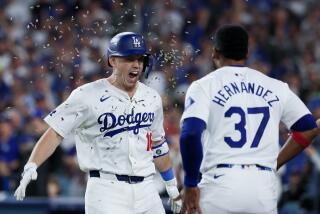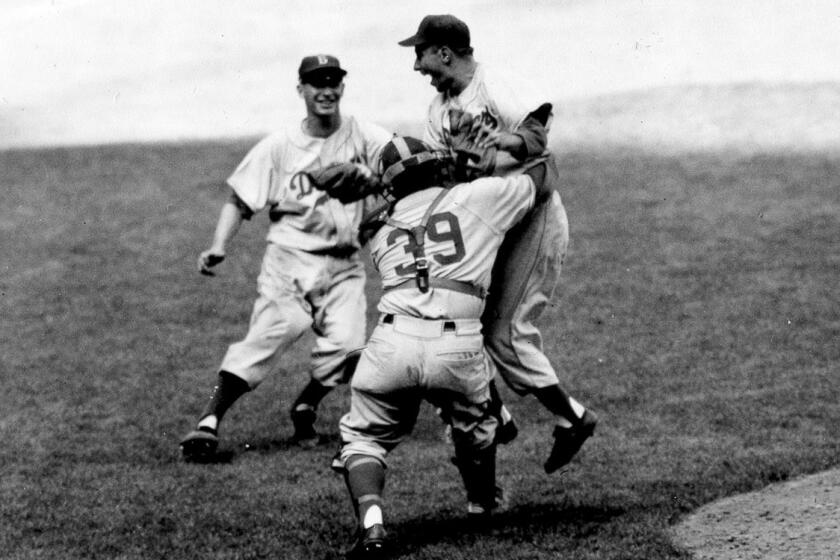Ross Stripling’s no-no try turns into oh-no cry for Dodgers in 3-2 loss to Giants
Reporting from San Francisco — The decision stemmed from caution, the noble pursuit of protecting a young man’s arm, rather than the quest for history. So Dave Roberts climbed the steps of his dugout onto a baseball diamond soaked by rain and asked for the baseball.
In the eighth inning of a 3-2 loss to San Francisco, Roberts chose discretion over risking injury to rookie Ross Stripling’s surgically repaired right arm. After 100 pitches across 71/3 innings of a no-hit debut, with the Dodgers leading, 2-0, Stripling handed the game to Roberts and walked into the dugout.
“Under no circumstance am I going to even consider putting his future in jeopardy,” Roberts said. “For me, it was a no-brainer.”
The choice stunned the crowd at AT&T Park. The fans jeered Roberts. The group would erupt just moments later, when Giants catcher Trevor Brown tied the score with a two-run homer off setup man Chris Hatcher.
Shock and joy reverberated through the park. The Dodgers wobbled in its wake. Hatcher jawed with umpire Jeff Kellogg over balls and strikes. Roberts harangued Kellogg until he received the first ejection of his managerial career. His departure allowed him time to ruminate on his decision, and he watched from his office as Giants shortstop Brandon Crawford ended the game in the 10th with a home run off Joe Blanton.
The loss gnawed at Roberts. But the eighth inning did not. “I feel good that I didn’t have to stress him too much,” Roberts said, “and put his career in jeopardy.”
Stripling exited after throwing his 100th pitch of the game. He had never before, in 48 minor league starts, expended himself to such an extent. He had just issued his fourth walk. It was his 15th appearance since his elbow reconstruction.
The Dodgers (3-2) established the 100-pitch mark as Stripling’s threshold before the game. Roberts had sent him back out for the eighth at 91 pitches as a nod to the chase for immortality. But he committed to removing him as soon as a runner reached base. On the mound, Stripling felt soggy and fatigued.
“I thought it was the right choice,” Stripling said. “I was tired. I had walked a couple late in those innings. It was the right call, whether it was because of a high pitch count or whatever, I think you could tell that I was trending downward.”
At 26, he is a favorite of Andrew Friedman, the president of baseball operations. Yet Stripling entered spring training as an afterthought. He underwent Tommy John surgery in 2014. He had never pitched above double-A. He rated below other in-house prospects like Julio Urias and Jose De Leon.
Then a calamitous spring forced him into the fold. Brett Anderson blew out his back. The shoulder of Hyun-Jin Ryu failed to respond to the rigors of daily use. On the day the team selected him as the fifth starter, Mike Bolsinger strained an oblique.
The Dodgers had optioned Stripling to the minors on March 17. But the front office viewed him as a more competitive option than either Carlos Frias or rookie Zach Lee. The team declared him its fifth starter on the first day of April — meaning he had to wade through seven days of nerves before he could take the mound.
Stripling planned to set aside 21 tickets for friends and family. His father wore a Texas A&M cap; the Dodgers chose Stripling from the school in the fifth round of the 2012 draft. His fiancee was probably the only other person in the building wearing his No. 68 jersey. Rain fell on the crowd from the first inning onward.
Before the game, Roberts advised Stripling to savor the moment and try to enjoy it. Stripling proved up to the task. He retired the first 10 batters he faced. Yasiel Puig snagged a sinking line drive off Matt Duffy’s bat in the second. Two innings later, Joc Pederson lunged to steal a hit from Denard Span.
Stripling was able to work comfortably in the upper third of the strike zone. He threw his curveball for first-pitch strikes. His changeup upset the timing of his opponents. And his fastball registered in the low 90s, with enough life to avoid hard contact.
“The curveball’s been his pitch for quite some time,” catcher A.J. Ellis said. “We know when that thing gets rolling, he’s got a great feel for it.”
In the fourth Stripling faced adversity for the first time, but escaped after a pair of walks. When he returned to the mound for the fifth, his teammates had handed him a two-run advantage. After a leadoff double from Pederson off Matt Cain, Ellis and Corey Seager each stroked RBI singles.
Granted a lead, Stripling gobbled up outs. The bottom of the fifth lasted 12 pitches. So did the bottom of the sixth.
Hunter Pence walked to lead off the seventh. As Stripling threw three consecutive balls to Brandon Belt, Pedro Baez warmed up. Stripling kept Baez out of the game by inducing a double-play ball from Belt. Duffy grounded out to end the inning.
“I was like, ‘All right, let’s see what happens here,’” Stripling said.
The rain intensified as the eighth inning began, providing a backdrop to the drama. Later, Stripling poked his head into Roberts’ office.
“It was a tough decision,” Roberts told Stripling. “But this is your first outing. You’ve got a whole season, a whole career.”
Stripling told him he understood. Together they would not pursue history. Instead they were bystanders to a defeat.
Follow Andy McCullough on Twitter: @McCulloughTimes
More to Read
Are you a true-blue fan?
Get our Dodgers Dugout newsletter for insights, news and much more.
You may occasionally receive promotional content from the Los Angeles Times.










